Studying Democracy Abroad: A Political Science Student’s Experience in the Czech Republic
Why I Chose to Study Abroad in the Czech Republic as a Political Science Student
When I chose to study abroad as a political science major, I wanted to immerse myself in a country with a complex past and a different democracy. I hoped to expand beyond American political theory and gain insight into how different systems operate. My time in Prague left me with a deeper understanding of democracy, shaped by new knowledge, meaningful conversations, and civic reflection.
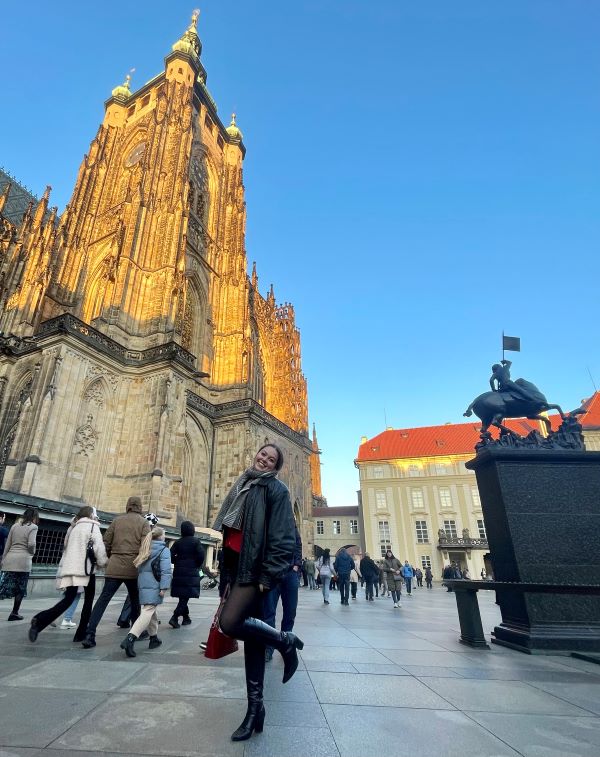
Me in front of St. Vitus Cathedral while seeing as many of Prague's sights as we could in one day.
Studying Political Science in Prague
Taking political science courses abroad was a highlight of my academic experience. I was enrolled in three courses through my host university, Anglo-American University in Prague. The two political science courses were “International Humanitarian Law” and “Democratization and the Survival of Autocrats.” These classes challenged what I thought about power, justice, leadership, and civil rights on a global scale.
What made these courses unforgettable was the other students who brought perspectives I hadn't encountered before. Once in my democratization class, a student from Hungary shared what it was like to grow up while Orbán was changing the constitution to centralize power. Another instance was in my International Humanitarian Law class; a Czech student shared how their Prime Minister (2017-2021) influenced public political decisions to benefit his own business.
Hearing stories like these made me realize how much I didn’t know. That feeling of not being able to stay in conversations pushed me to stay up to date on current global news beyond just where American interest is. These weren’t just classes; they were immersive and challenging experiences.
The lesson I took away from studying political science abroad was that no nation’s politics exist in isolation. Democracy, rights, and resistance are global concerns, and hearing different voices helped me become a more informed and thoughtful political thinker.
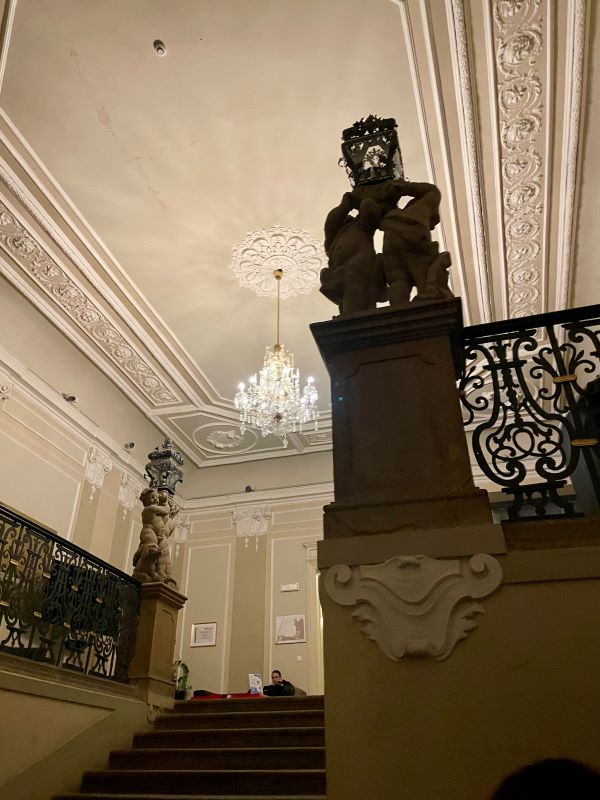
Sight when walking up the stairs of Anglo-American University in Prague, which was my host university and where I attended all non-CEA CAPA courses.
Comparing Czech and U.S. Political Systems
One of the most eye-opening parts of studying in Prague was learning about how different democracy can look.
My CEA CAPA class “Democracy in the Czech Republic” was able to visit the Czech Chamber of Deputies which helped bring these concepts to life. During the tour, we learned about the voting system, how it worked, and its pros and cons. The tour guide told us of a recent controversy involving coalition voting instructions that led to distorted results. The guide’s passion reminded me of similar frustrations within the U.S. system. It was a telling example of how culture and context shape democratic processes and also the issues that plague this type of system.
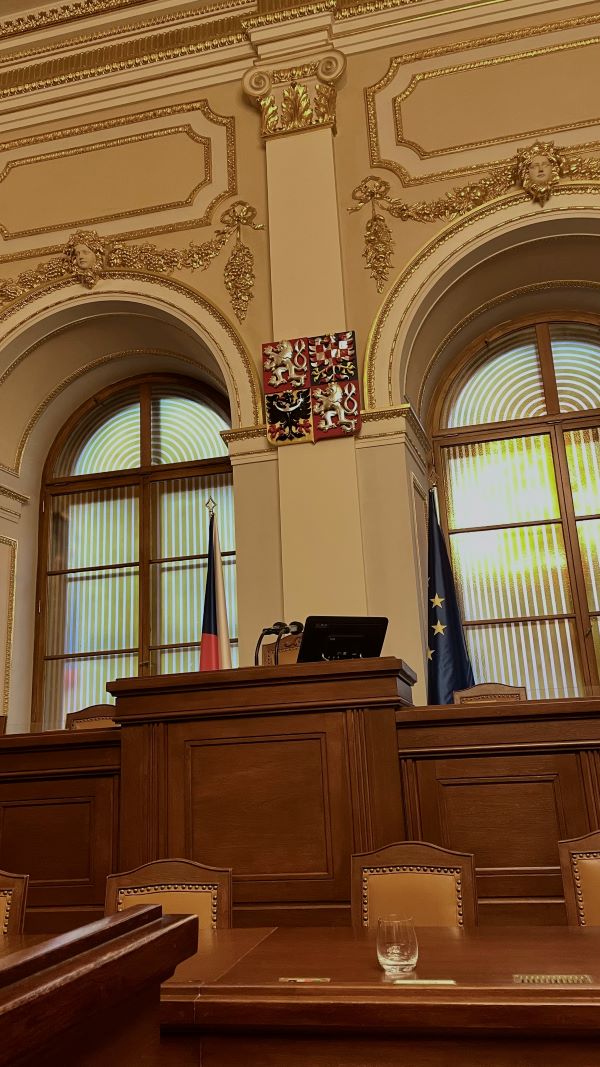
Within Thun Palace, the place of modern Czech parliament, is the chamber of deputies. This photo is of the seat of the Speaker of Parliament for the Czech Republic, with the Czech Republic flag to the left and the European Union flag to the right.
History and Democracy
Understanding how countries arrive at democracy was another key part of my experience. Through my CEA CAPA course, we explored the country's political evolution. Until then, I hadn’t realized how much I took U.S. democratic history for granted.
American students typically grow up learning about the Revolutionary War, Civil Rights Movement, and other key moments. Through my CEA CAPA course, I gained a similar foundation in Czech history. Learning about the Czech Republic's path to democracy revealed how democracy is born from conflict and highlighted how different traumas faced by a country and its people shape the democratic government that is created by them, for their future.
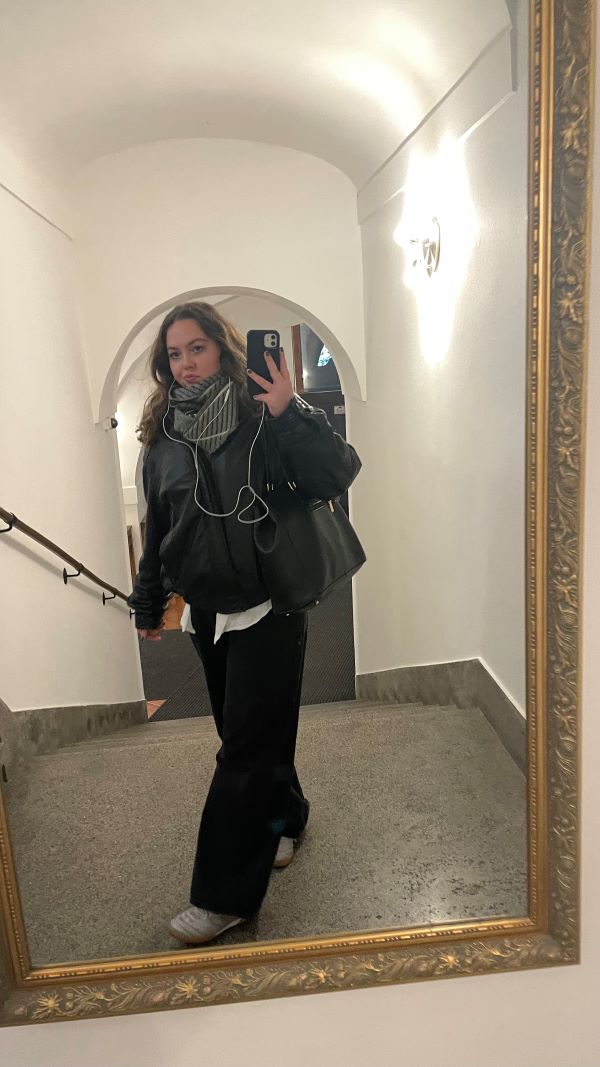
Mirror picture of me walking up the stairs to the CEA CAPA Study Center in a building in the heart of Prague, where I took my CEA CAPA courses.
Weight of the Past
I was able to learn about a big part of the country’s trauma through a visit to Terezín, a former concentration camp. Walking the grounds forced me to confront the atrocities that occurred in the country during its Nazi occupation. The weight of the past and the stories from those sites redefined my understanding of how history shapes political identity.
During our visit we saw artwork and poems from children who were at Terezin, often separated from their families who were sent to different camps. We saw mail that the Nazis kept instead of actually mailing to their loved ones. We were faced with what the sleeping situation was like and how inhumane the treatment was.
Terezin felt especially cruel because here prisoners were forced to participate, as actors, musicians and the director, in a Nazi propaganda film which portrayed the camp as a spa where Jews could retire rather than the horrific conditions, they would experience there.
My CEA CAPA class visited sites from the country’s Communist past, such as a former nuclear bunker turned StB surveillance center and the Museum of Communism in Prague. At those places, I learned how heavily fear and control was part of daily life, how dissent was silenced, and how the Communist regime masked the horrific reality from the outside world. Visiting these sites and learning the history of the country really emphasized how young and fragile the Czech democracy is, how it is still in the process of being built, defined, and growing beyond all the trauma the country and its citizens have faced.
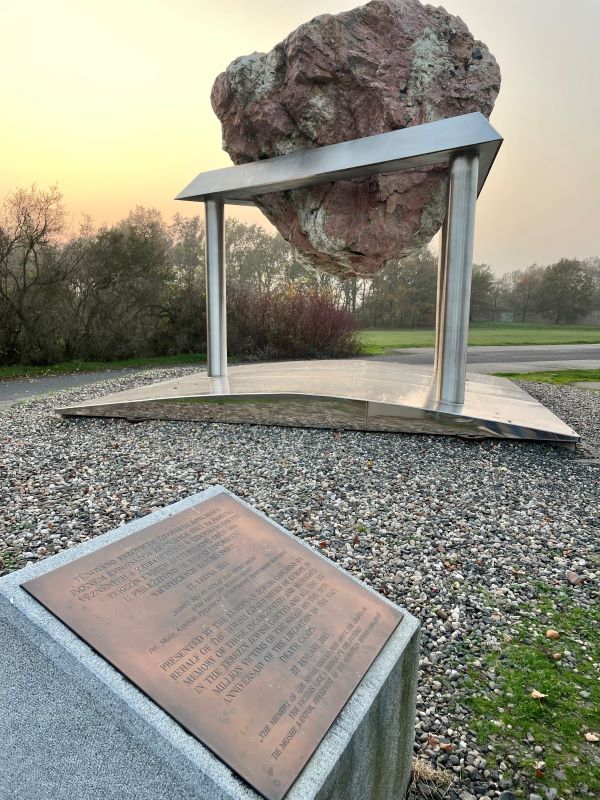
Photo of Terezín Monument, to remember those murdered at the concentration camp, with its memorial plaque.
Visiting the Communist sites as well as Terezin is a reminder of one section of the Czech Republic's bloody history and the loss it faced on its path to democracy. Visiting the camp, facing the hollowness which permeates the entire place, the hidden Jewish prayer rooms, and the tiny hidden rooms which entire Jewish families would hide in the town until they were found by Nazis all forced me to face my discomfort and made it painfully clear how history shapes the political system and identity of a country.
Just as the U.S. still grapples with its own difficult legacy, the Czech Republic carries the weight of its past into its politics today. The parallels of hardship on the path to democracy redefined democracy, to me, not just as a structure, but as something living, defined by its remembered past, and which must constantly evolve to face the challenges of today.
Staying Politically Engaged from Abroad
Even while abroad, I remained engaged in U.S. politics. With support from CEA CAPA, I successfully voted in the 2024 U.S. presidential election from Prague. Some students mailed their ballots, others voted online. Voting abroad reminded me that political participation doesn’t stop at the border and reinforced my commitment to staying involved, no matter where I am.
While in Prague, I also learned how voting works in the Czech Republic. There, all citizens are automatically registered to vote and come election days can quickly vote at any voting location. The simplicity of their voting system made me reflect even more on the differences between the two countries and how those differences shape the country’s government and its ability to reflect the population.
I also was able to see for myself how the European Union influences the politics of individual countries, and specifically how the Czech government needed to constantly balance domestic goals and EU-wide expectations. Seeing this really drove home the interconnectedness of modern politics and the value of having a supranational body in today’s globalized world.
Advice for Future Students
If you're studying political science, history, or international relations, I highly recommend studying abroad. Reading about coalition governments, populist movements, or human rights violations is one thing but living in a country where those issues all have occured, is another.
A Note on Difficult Conversations
While academics were the focus, emotionally charged topics often came up—issues like minority oppression, international conflict, and election integrity. These weren’t just theoretical debates. They were real, challenging, and sometimes uncomfortable.
One class stands out. The day after the U.S. presidential election, we had a midterm based on an article titled My Country Had Its Own Trump. Here’s How We Beat Him by Dalibor Rohac. After we turned in the exam, our discussion shifted to the U.S. election results. Students shared perspectives on Trump’s leadership and what his re-election meant globally.
Throughout the semester, we discussed the marginalization of Roma people in Europe, U.S. racial injustice, the Israel-Palestine conflict, authoritarianism in Europe, and the legacy of apartheid in South Africa. These conversations helped shape my growth abroad. They forced me to confront global injustice and understand the power—and limits—of political systems in addressing it. While difficult, these discussions made me a more thoughtful and aware political student.
Final Reflections
Studying abroad taught me more than any textbook could. Sitting in classes with international students introduced me to perspectives and stories I had never faced before. It reshaped how I view politics and my role in it. Studying political science grew from books and theories into figuring out the effect on lives and people.
Prague taught me that democracy looks different in every country. It is not a finished system, instead it is an ongoing conversation. It is something that is constantly evolving, and citizens must hold it accountable for it to work. We must participate in the system, we must question the system, and we must protect democracy.
My final message is this: If you’re considering studying abroad, take the leap. Go somewhere new, listen to unaccustomed perspectives, ask hard questions, have tough conversations and let the unfamiliar things change you and help you grow. The world is so big, so interconnected, and has so much to teach us. And studying abroad was the best teacher I could have ever asked for.
This post was written by Morgan Romine, a CEA CAPA Alumni Ambassador from Chapman University, and studied abroad in Prague, Czech Republic.











